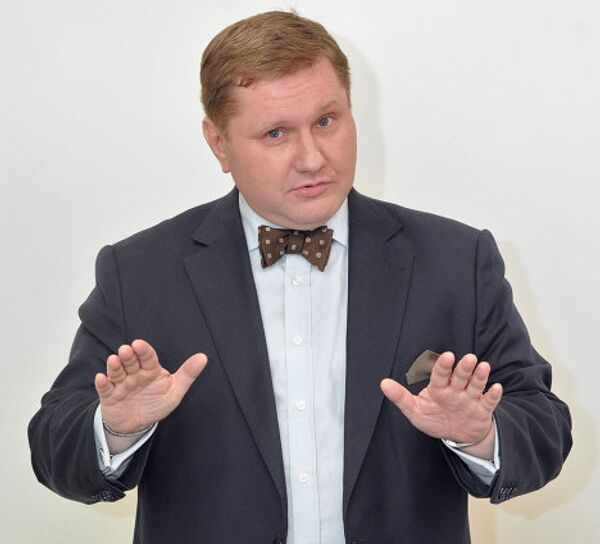It is exactly 10 years since Mikhail Khodorkovsky, at the time Russia’s richest man and former owner of the oil giant Yukos, was seized by special police unit in the airport in the Siberian city of Novosibirsk. He was marched away, handcuffed and under armed guard. Later came trial, imprisonment and international fame, albeit not, perhaps, of a kind he ever hoped to acquire.

On the anniversary of an event that many name as a defining moment of the Putin era, Russia’s most respected independent pollster, the Levada Centre, conducted a survey in Moscow on attitudes to Khodorkovsky, his present day status in Muscovites’ minds and his possible future.
The results are somewhat predictable, bearing in mind the fact that Khodorkovsky spent a decade moving from ‘Russia’s most hated oligarch’ into the closest thing the country has to a Vaclav Havel-like figure. Only seven percent of those polled expressed dislike of the former Yukos owner, while more than 40 percent have a positive opinion of him and another 40-something are neutral.
The same 40 percent probably think that Khodorkovsky will become active as a public figure and possibly politician after his release, due next year. It can be safely assumed that these people actually want Russia’s most famous prisoner to do exactly that – go into politics. Similar polls in Russia’s other big cities (where the country’s political battles are traditionally fought) show only slightly worse results for the jailed billionaire.
So according to this one poll, at least, Khododkovsky’s approval rating can easily be compared to that of his nemesis President Vladimir Putin, although it is still lower by quite a few points.
This transformation is a result of Khodorkovsky’s strategic vision and his Solzhenitsyn-like self-confidence. Ten years ago few imagined that he’d be able to withstand the many pressures of prison life. People said prison would break him. But he turned out to be something of a marathon runner, running … where?
British academic Richard Sakwa who four years ago published a book about the Khodorkovsky case, once compared his life to that of Nelson Mandela: “Mandela’s memoirs are called ‘A Long Walk to Freedom’. Well, Khodorkovsky’s future reminiscences may well be called ‘A Long Walk to the Kremlin’. ‘I am not saying he’ll arrive but he seems to be walking in that direction’, Sakawa told a stunned audience at Chatham House.
Well, this really the case? Khodorkovsky himself said a few times that he is not planning on becoming a politician. And he probably isn’t, in a conventional sense of the word.
But his public activity, well-measured, and targeting different audiences both inside and outside Russia rather proves that he has already become a voice to be reckoned with in any debate about Russia’s future.
Moreover, now that the Kremlin is focused on maintaining ‘stability’ at all costs and the fragmented opposition groping about in the dark searching for a strategy, Mikhail Borisovich (or simply ‘MBKh’, as his supporters call him) seems to be the only man in Russia offering a rousing and optimistic, yet utterly realistic programme of lifting the country out of its institutional crisis.
This element of civic dignity, which Khodorkovsky considers indispensible for Russia’s development, permeates his writings on reforms to the justice system, police, political institutions and economic structures.
What gives his words credibility is not only the fact that they come from someone who had everything and lost it and never shed a tear, but also from Khodorkovsky’s evident struggle with himself and gradual ideological evolution towards something that is perhaps as close to the Christian Democrat worldview as is possible in today’s Russia.
One may argue the things he says, but one cannot deny their logical consistency, which reveals a political leader in the making. This may be subconscious, but is more likely intentional.
Personally I think that Khodorkovsky knows he will play a major role in Russian politics when he is freed next year.
It is too early to say where his road will lead him. But it has already been a unique trek, well worth a novel.
The views expressed in this article are the author’s and may not necessarily represent those of RIA Novosti.
What is Russia's place in this world? Unashamed and unreconstructed Atlanticist, Konstantin von Eggert believes his country to be part and parcel of the "global West." And while this is a minority view in Russia, the author is prepared to fight from his corner.
Konstantin von Eggert is a freelance commentator and consultant. In 2010-2013 he worked for Kommersant FM radio in Moscow as a commentator and as Editor-in-Chief. He was Diplomatic Correspondent for Izvestia in the 1990s and later the BBC Russian Service Moscow Bureau Editor. Konstantin has also spent some time working as ExxonMobil Vice President in Russia. He was made Honorary Member of the Order of the British Empire by Queen Elizabeth II.
Due West: Russia’s Weak Identity Is the Key to Moscow’s Nationalist Riots
Due West: Deciphering the Kremlin: Reading the Runes of Russian Officialdom
Due West: Black Clouds on the Horizon for Russia and Its Neighbors
Due West: A Dividing Issue, 20 Years On: Russia’s 1993 Constitutional Crisis
Due West: Russia’s G20 Summit Promised Little, and Delivered Even Less
Due West: The Kremlin Faces Tough Choices Over Syria
Due West: Russia’s Aggressive Defensiveness Is Damaging Its Image
Due West: Why Putin Sees Obama as a Weakling
Due West: Checks Without Balances
Due West: The Right to Bear Arms: An Issue to Divide Any Society



